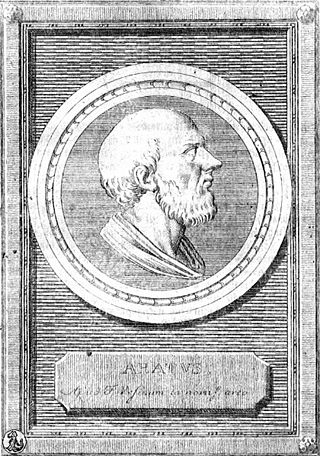Related Research Articles
Alexander Aetolus was a Greek poet and grammarian, the only known representative of Aetolian poetry.
Lucius Afranius was an ancient Roman comic poet who lived at the beginning of the 1st century BC.

Gaius Cilnius Maecenas was a friend and political advisor to Octavian. He was also an important patron for the new generation of Augustan poets, including both Horace and Virgil. During the reign of Augustus, Maecenas served as a quasi-culture minister to the Roman emperor but in spite of his wealth and power he chose not to enter the Senate, remaining of equestrian rank.

Aratus was a Greek didactic poet. His major extant work is his hexameter poem Phenomena, the first half of which is a verse setting of a lost work of the same name by Eudoxus of Cnidus. It describes the constellations and other celestial phenomena. The second half is called the Diosemeia, and is chiefly about weather lore. Although Aratus was somewhat ignorant of Greek astronomy, his poem was very popular in the Greek and Roman world, as is proven by the large number of commentaries and Latin translations, some of which survive.
Statius Caecilius, also known as Caecilius Statius, was a Roman comic poet.

Antimachus of Colophon, or of Claros, was a Greek poet and grammarian, who flourished about 400 BC.

Nicander of Colophon, Greek poet, physician and grammarian, was born at Claros, near Colophon, where his family held the hereditary priesthood of Apollo. He flourished under Attalus III of Pergamum.
Gaius Caesius Bassus was a Roman lyric poet who lived in the reign of Nero.

Johann Carl Otto Ribbeck was a German classical scholar. His works are mostly confined to criticisms of Latin poetry and to classical character sketches.

The gens Rabiria was a minor plebeian family at Ancient Rome. Although of senatorial rank, few members of this gens appear in history, and the only one known to have held any of the higher offices of the Roman state was Gaius Rabirius Postumus, who was praetor circa 48 or 47 BC.
Gaius Valerius Flaccus was a 1st-century Roman poet who flourished during the "Silver Age" under the Flavian dynasty, and wrote a Latin Argonautica that owes a great deal to Apollonius of Rhodes' more famous epic.

Gnaeus Naevius was a Roman epic poet and dramatist of the Old Latin period. He had a notable literary career at Rome until his satiric comments delivered in comedy angered the Metellus family, one of whom was consul. After a sojourn in prison he recanted and was set free by the tribunes. After a second offense he was exiled to Tunisia, where he wrote his own epitaph and committed suicide. His comedies were in the genre of Palliata Comoedia, an adaptation of Greek New Comedy. A soldier in the Punic Wars, he was highly patriotic, inventing a new genre called Praetextae Fabulae, an extension of tragedy to Roman national figures or incidents, named after the Toga praetexta worn by high officials. Of his writings there survive only fragments of several poems preserved in the citations of late ancient grammarians.
Gaius Albinovanus Pedo, sometimes mistakenly called C. Pedo Albinovanus, was a Roman poet who flourished during the Augustan age.
Marcus Furius Bibaculus, was a Roman poet, who flourished during the last century of the Republic.
Theodectes was a Greek rhetorician and tragic poet, of Phaselis in Lycia.
Hermippus was the one-eyed Athenian writer of the Old Comedy, who flourished during the Peloponnesian War.
Lucius Varius Rufus was a Roman poet of the early Augustan age.
Publius Valerius Cato was a grammarian and poet of the Roman Republic. He was a leader of the Neoteric movement, whose followers rejected national epic and drama in favor of the artificial mythological epics and elegies of the Alexandrian school, preferring Euphorion of Chalcis to Ennius. They regarded knowledge of Greek literature and myths, and strict adherence to metrical rules, as indispensable to the poet. The great influence of Cato is attested by the lines: Cato grammaticus, Latina Siren, Qui solus legit ac facit poetas.

Philitas of Cos, sometimes spelled Philetas, was a Greek scholar, poet and grammarian during the early Hellenistic period of ancient Greece. He is regarded as the founder of the Hellenistic school of poetry, which flourished in Alexandria after about 323 BC. Philitas is also reputed to have been the tutor of Ptolemy II Philadelphus and the poet Theocritus. He was thin and frail; Athenaeus later caricatured him as an academic so consumed by his studies that he wasted away and died.
Philo was a Greek poet and writer. He was a Hellenistic Jewish author of an epic poem in Greek hexameters on the history of Jerusalem. He lived at an earlier date than Philo the philosopher. Alexander Polyhistor quotes several passages of the poem, and is the source of the extracts in Eusebius. This is probably the Philo who is mentioned by Clemens Alexandrinus and by Josephus, who calls him "the elder".
References
- This article incorporates text from a publication now in the public domain : Chisholm, Hugh, ed. (1911). "Rabirius". Encyclopædia Britannica . Vol. 22 (11th ed.). Cambridge University Press. p. 773.